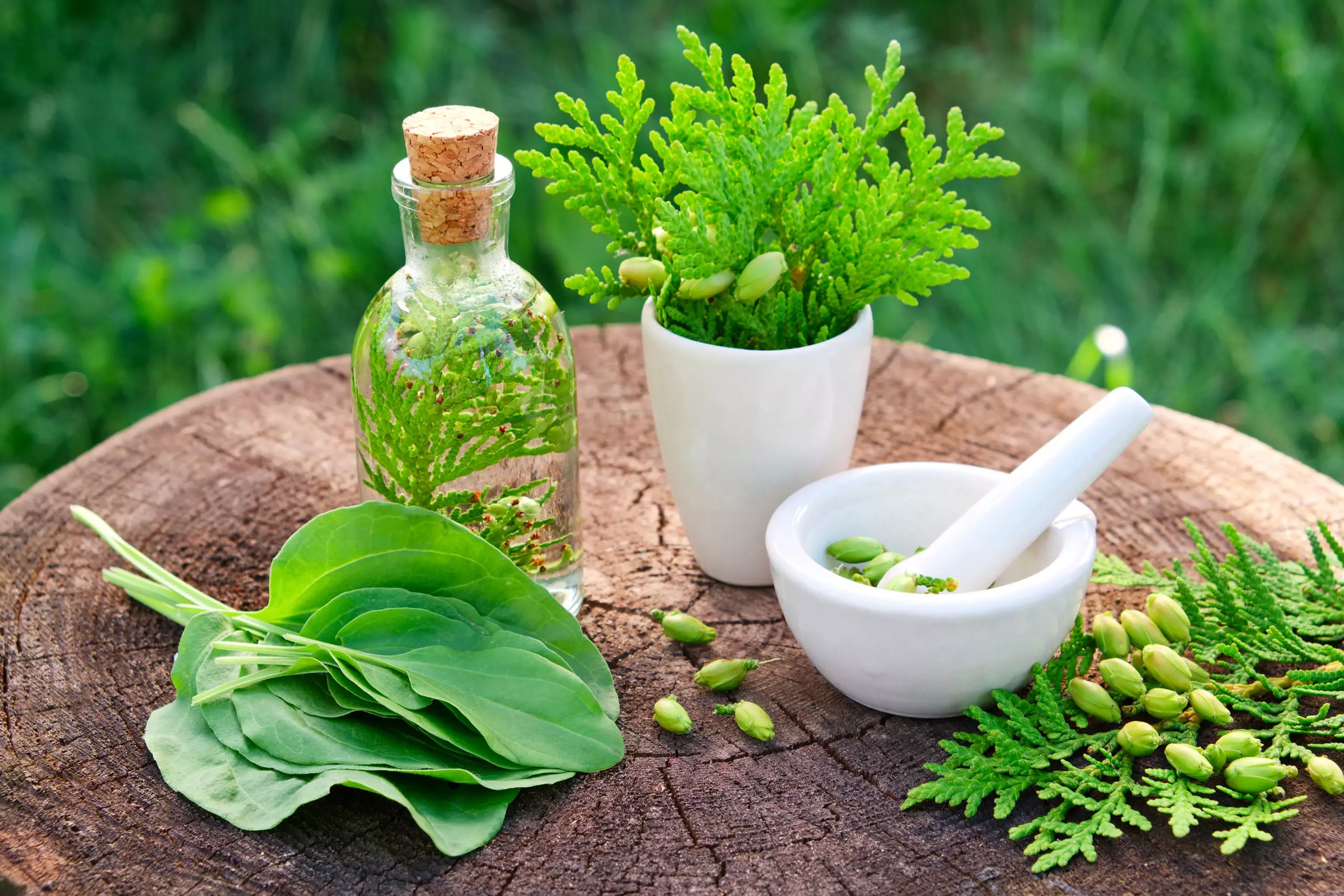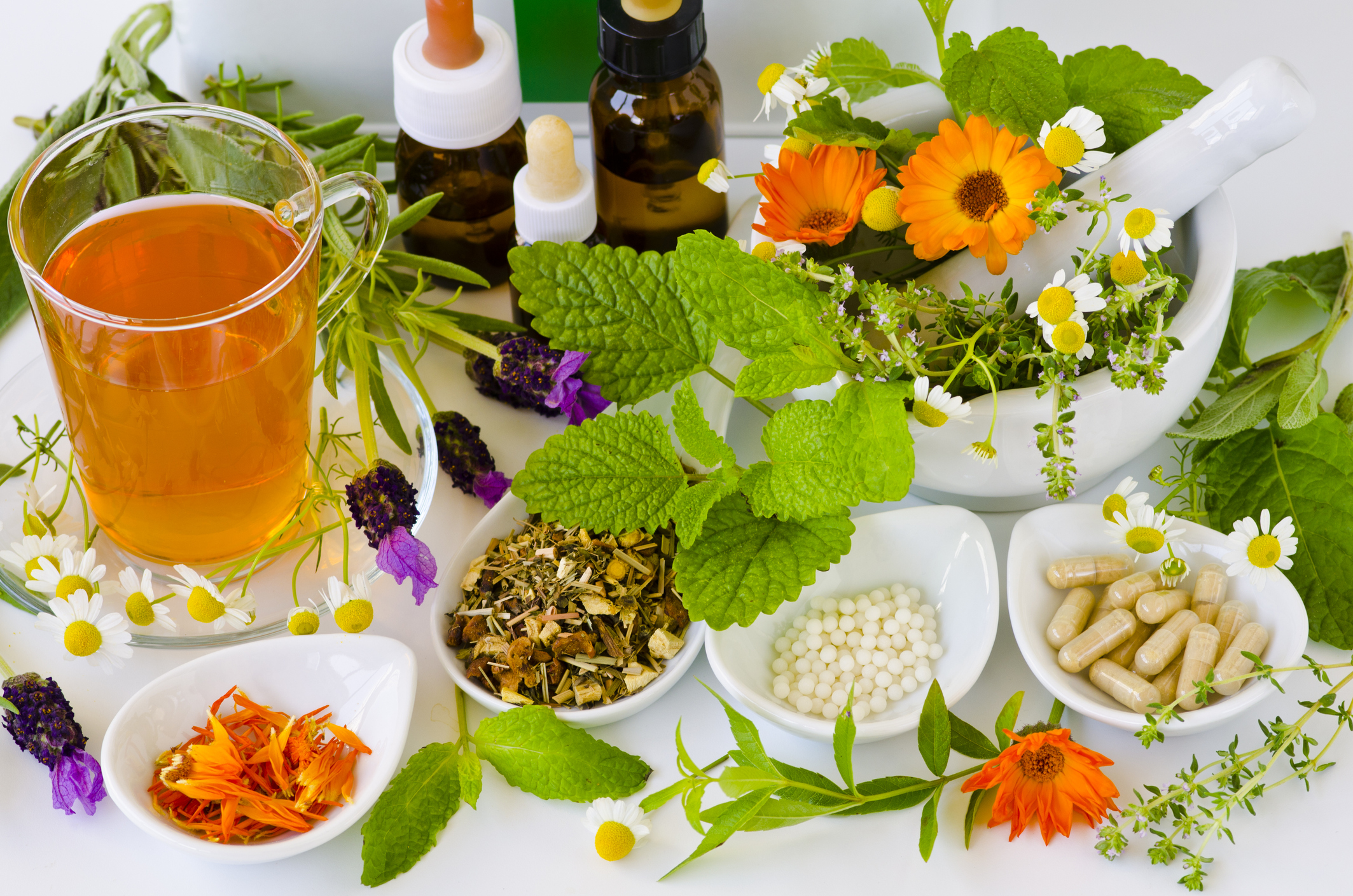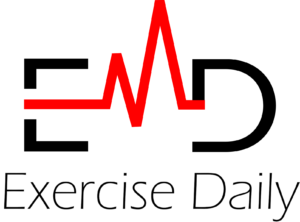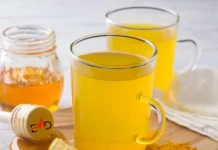Exercise Daily – When promoting health and wellness, many people are turning to the natural healing powers of herbal medicine and herbs. Herbal medicine has a long history and is deeply rooted in various cultures worldwide. From traditional Chinese medicine to indigenous practices, using herbs for medicinal purposes has been prevalent for centuries. Let’s delve into the fascinating world of herbal medicine, exploring its benefits, popular herbs, and important considerations when using herbal remedies.
Herbal Medicine
Herbal medicine, also known as herbalism, is a holistic approach to healing that utilizes the therapeutic properties of plants and their extracts. It uses various plant parts, including leaves, flowers, roots, and bark, to create remedies that restore balance and promote well-being. The practice of herbal medicine dates back thousands of years and has been integral to traditional medicine systems globally.

The Power of Nature: Benefits of Herbal Medicine
The Therapeutic Potential of Herbs
Herbs possess many bioactive compounds that contribute to their medicinal properties. These compounds, such as anti-inflammatory, antimicrobial, antioxidant, and analgesic properties, can affect the body. Unlike synthetic drugs, herbal remedies often work synergistically, with multiple compounds acting together to produce therapeutic effects. This complexity can result in a more holistic approach to healing, addressing the symptoms and underlying causes of a health condition.
Herbal Medicine and Holistic Healing
One of the core principles of herbal medicine is the belief in the interconnectedness of the body, mind, and spirit. Herbalists approach health and wellness holistically, considering the individual as a whole rather than focusing solely on the symptoms. This approach aligns with the growing interest in holistic healing and the recognition that well-being encompasses physical, mental, and emotional aspects.
Herbal Medicine and Conventional Medicine
Herbal medicine is often used alongside conventional medical treatments as a complementary approach. Many individuals find that incorporating herbal remedies into their healthcare routine enhances their well-being and supports their body’s natural healing processes. However, it is crucial to consult with a healthcare professional before starting any herbal treatment, especially if you are currently taking prescription medications or have underlying health conditions.
Exploring Popular Herbal Remedies
St. John’s Wort: Nature’s Antidepressant
People commonly use St. John’s Wort as an herbal remedy to treat mild to moderate depression and anxiety. This herb contains bioactive compounds believed to boost serotonin, dopamine, and norepinephrine levels in the brain, neurotransmitters associated with mood regulation. It’s crucial to note that St. John’s Wort may interact with certain medications, like antidepressants and oral contraceptives, so consulting with a healthcare professional before using this herb is essential.
Ginseng: A Boost for Vitality
In traditional medicine, people use ginseng, a well-known herb, to promote vitality and overall well-being. It is believed to possess adaptogenic properties, aiding the body in adapting to physical and mental stress. Ginseng is popular for enhancing energy levels, improving cognitive function, and bolstering the immune system. However, individuals with high blood pressure should exercise caution when using ginseng, as it may increase blood pressure in some cases.
Saw Palmetto: Promoting Prostate Health
Saw palmetto is a popular herbal remedy often used to support prostate health and alleviate symptoms associated with benign prostatic hyperplasia (BPH). This herb works by inhibiting the production of an enzyme that contributes to prostate enlargement. Saw palmetto has been extensively studied, and research suggests that it may improve urinary flow and reduce the frequency of nighttime urination in individuals with BPH. As with any herbal remedy, it is advisable to consult with a healthcare professional before starting saw palmetto supplementation.

Herbal Remedies for Post-Workout Recovery
In pursuing fitness and optimal health, post-workout recovery plays a crucial role. After intense physical activity, our bodies undergo stress and strain, resulting in muscle fatigue, inflammation, and oxidative damage. While rest, proper nutrition, and hydration are vital components of recovery, herbal remedies can also significantly accelerate healing.
Turmeric (Curcuma longa)
Turmeric, a vibrant yellow spice, contains a potent compound called curcumin. Known for its anti-inflammatory and antioxidant properties, curcumin reduces exercise-induced muscle damage and inflammation. It also promotes tissue repair and supports joint health, making it an excellent herb for post-workout recovery. Consuming turmeric in the form of capsules, adding it to meals, or drinking turmeric tea can all provide beneficial effects.
Ginger (Zingiber officinale)
Ginger is another herb with remarkable anti-inflammatory properties. It helps alleviate muscle soreness and reduces post-workout pain. Additionally, ginger aids in digestion, which is essential for nutrient absorption and overall recovery. Incorporating ginger into post-workout meals, consuming ginger tea, or taking ginger supplements can help enhance recovery.
Arnica (Arnica montana)
Arnica, a herb with beautiful yellow flowers, has been traditionally used to treat bruises, sprains, and muscle soreness. It contains compounds that reduce inflammation, relieve pain, and improve circulation. Applying arnica-infused creams or ointments topically can soothe sore muscles and aid healing.
Boswellia (Boswellia serrata)
Boswellia, also known as Indian frankincense, possesses potent anti-inflammatory properties. The active compounds in Boswellia, called boswellic acids, help reduce inflammation and relieve joint pain. Incorporating Boswellia supplements or utilizing them in topical forms can help alleviate post-workout inflammation and support joint health.
Echinacea (Echinacea purpurea)
Echinacea is a popular herb known for its immune-boosting properties. Regular exercise can temporarily suppress the immune system, making individuals more susceptible to illness. Echinacea helps strengthen the immune system, reducing the risk of infections and supporting overall well-being. Consuming Echinacea supplements or drinking Echinacea tea can provide immune support during post-workout recovery.
Ashwagandha (Withania somnifera)
Ashwagandha, an adaptogenic herb widely utilized in Ayurvedic medicine, helps the body adapt to stress and foster overall balance. Studies have demonstrated its ability to lower cortisol levels (stress hormone) and enhance muscle strength and recovery. Integrating Ashwagandha supplements or consuming them in powdered form can aid in stress management and facilitate post-workout healing.
Peppermint (Mentha piperita)
Peppermint is known for its soothing properties and ability to relieve muscle tension and pain. It contains menthol, which provides a cooling effect and helps relax muscles. Applying peppermint oil topically or drinking peppermint tea can help soothe post-workout muscle soreness and promote relaxation.
Chamomile (Matricaria chamomilla)
Chamomile is renowned for its calming and anti-inflammatory properties. It helps reduce muscle spasms, alleviate pain, and promote restful sleep – all essential elements of post-workout recovery. Chamomile tea before bedtime can aid relaxation and support the body’s healing process.

Herbs for Stress Relief: Balancing Mind, Body, and Exercise
Prolonged stress can negatively affect both our mental and physical well-being. While we know exercise effectively relieves stress, incorporating certain herbs into our routine can further enhance the calming and balancing effects.
Lavender (Lavandula angustifolia)
People widely recognize lavender, a popular herb, for its calming properties. Studies have demonstrated that its soothing aroma reduces anxiety levels and promotes relaxation. Utilizing lavender essential oil in aromatherapy or drinking lavender tea can help alleviate stress and establish a peaceful atmosphere. Moreover, lavender can improve sleep quality, a crucial factor in stress management.
Chamomile (Matricaria chamomilla)
The gentle herb chamomile is renowned for its calming and soothing effects. It promotes relaxation, eases tension, and alleviates anxiety. Drinking chamomile tea before bedtime aids in achieving restful sleep, enabling the body and mind to recover from stress.
Lemon Balm (Melissa officinalis)
Lemon balm, a member of the mint family, emits a gentle, lemony scent. Traditionally, people have utilized it to diminish anxiety and induce relaxation. You can consume lemon balm as a tea or take it in supplement form to calm the mind and relieve stress. Additionally, it assists in enhancing sleep quality, a crucial aspect of stress management.
Holy Basil (Ocimum sanctum)
In Ayurvedic medicine, holy basil, or tulsi, holds sacred status as an herb. It possesses adaptogenic properties that enable the body to cope with stress and maintain overall balance. Holy basil tea or supplements support the nervous system, alleviate anxiety, and enhance mental clarity. Additionally, it is believed to bolster resilience to stress.
Passionflower (Passiflora incarnata)
Passionflower, a herb renowned for its soothing effects, alleviates anxiety, promotes relaxation, and enhances sleep quality. You can consume passionflower as a tea or take it in supplement form to reduce stress and induce a sense of calmness, which is particularly beneficial for individuals experiencing restlessness or racing thoughts due to stress.
Rhodiola (Rhodiola rosea)
Rhodiola is an adaptogenic herb that helps the body adapt to stress and promote resilience. It has been shown to reduce fatigue, improve mood, and enhance cognitive function. Rhodiola supplements can be beneficial for individuals experiencing stress-related exhaustion and mental fatigue. It supports overall well-being and provides a natural boost to the body’s stress response.
Valerian Root (Valeriana officinalis)
Valerian root, a herb renowned for its soothing properties, reduces anxiety, promotes relaxation, and enhances sleep quality. You can consume valerian root as a tea or take it in supplement form for stress relief, which is especially beneficial for individuals experiencing stress-induced insomnia or restlessness.
Using Herbal Medicines Safely
Clinical Trials and Efficacy of Herbal Medicines
Clinical trials play a crucial role in assessing the safety and efficacy of herbal medicines. These trials involve rigorous scientific testing to evaluate specific herbs’ potential benefits and risks. While some herbal remedies have shown promising results in clinical trials, it is important to note that not all herbs have undergone extensive scientific investigation. Therefore, gathering reliable information and consulting with healthcare professionals is essential to make informed decisions regarding herbal medicine use.
Considerations for Using Herbal Supplements
There are several important considerations to remember when using herbal supplements. First, choosing reputable brands that adhere to quality manufacturing practices is crucial. Reading product labels and ensuring that the supplement meets regulatory standards is essential. Additionally, it is important to inform healthcare professionals about herbal supplements, as they can provide guidance and monitor potential interactions with prescription medications or existing health conditions.
Interactions and Side Effects of Herbal Medicines
While considering herbal medicines generally safe, understanding potential interactions and side effects remains crucial. Some herbs may interact with prescription medications, compromising their effectiveness or triggering adverse effects. Informing healthcare professionals about any herbal medicines being taken is crucial to minimize the risk of interactions. Furthermore, certain individuals may have a higher susceptibility to allergic reactions to specific herbs, emphasizing the necessity of comprehending potential side effects and monitoring for any adverse reactions.

Buying and Regulating Herbal Medicines
Ensuring Quality and Safety
When purchasing herbal medicines, it is crucial to ensure their quality and safety. Choosing reputable brands and products that have undergone quality testing and adhere to regulatory standards is essential. Reading customer reviews and seeking recommendations from trusted sources can help make informed purchasing decisions. Furthermore, buying herbal medicines from reliable sources is advisable to minimize the risk of counterfeit or adulterated products.
Regulation of Herbal Medicinal Products
In various countries, regulatory bodies handle herbal medicines differently. For instance, in the United States, the Food and Drug Administration (FDA) regulates the marketing and sale of herbal products under the Dietary Supplement Health and Education Act (DSHEA). However, it’s crucial to recognize that regulations differ, and individuals should acquaint themselves with the specific guidelines and regulations in their respective countries or regions.
The Role of Health Professionals
While herbal medicines are available over the counter, consulting with healthcare professionals before starting any herbal treatment is essential. They can provide valuable insights, assess potential interactions or risks, and guide you toward appropriate herbal remedies for your specific health needs. Health professionals, such as herbalists, naturopaths, or integrative medicine practitioners, can offer personalized advice and support to ensure the safe and effective use of herbal medicines.
FAQs – Exploring the Healing Powers of Herbal Medicine and Herbs
Q: Are herbal medicines regulated for safety and effectiveness?
A: Yes, herbal medicines are regulated differently in various countries to ensure their safety and effectiveness. Regulations may include quality control measures, labelling requirements, and adherence to manufacturing standards.
Q: Can herbal medicines interact with prescription medications?
A: Some herbs can interact with prescription medications, either reducing their effectiveness or causing adverse effects. It is important to inform healthcare professionals about any herbal medicines being taken to minimize the risk of interactions.
Q: Are herbal medicines safe for everyone?
A: While generally considered safe, certain individuals may have a higher susceptibility to allergic reactions or specific health conditions warranting caution when using herbal medicines. Consulting with healthcare professionals before initiating any herbal treatment is advisable.
Q: Where can I buy reliable and high-quality herbal medicines?
A: You can purchase reliable and high-quality herbal medicines from reputable brands, health food stores, or online retailers specializing in herbal products. Making informed purchasing decisions involves reading customer reviews and seeking recommendations.
Q: Can herbal medicines replace conventional medical treatments?
A: Patients often use herbal medicines as complementary approaches alongside conventional medical treatments. Consulting with healthcare professionals is crucial to determine the most appropriate treatment plan for your specific health needs.
Conclusion
Herbal medicine and herbs offer a wealth of healing potential for those seeking natural remedies and holistic approaches to health and wellness. With their rich history and diverse range of applications, herbal medicines continue to capture the interest of individuals worldwide. By understanding the benefits, considering safety measures, and seeking guidance from healthcare professionals, one can harness the power of herbal medicine to support one’s well-being and embark on a journey of natural healing.






